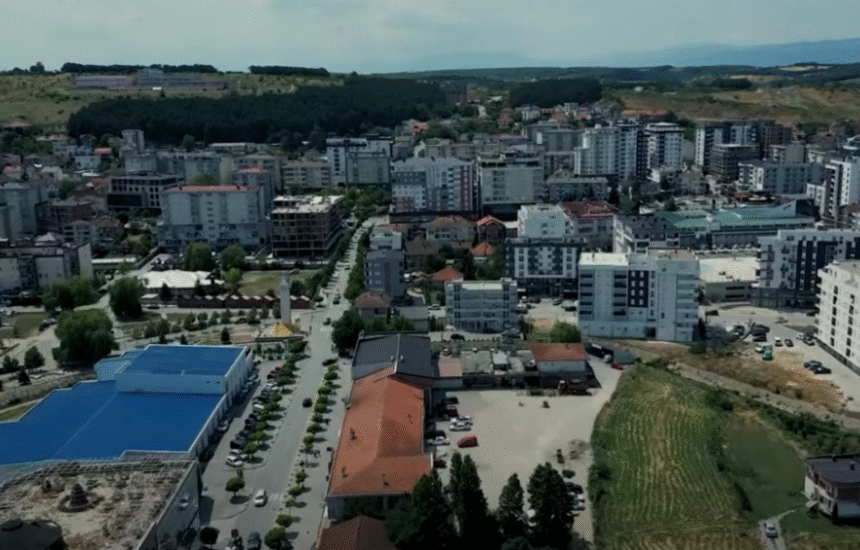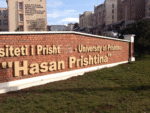Skënderaj municipality continues to struggle with long-standing issues related to drinking water shortages and inadequate sewage systems, despite numerous political promises and projects initiated over recent years.
According to a previous study by the GAP Institute, Fadil Nura, who became mayor of Skënderaj in 2021, made a total of 66 electoral promises. Out of these, 32 have been fulfilled, 16 partially completed, 13 started but unfinished, and 5 have not even begun.
One of the most notable failed projects is a wood processing and concrete products factory planned in the village of Polac. Announced as the largest investment in the municipality worth 4 million euros, promising around 100 new jobs, it remains an unfinished concrete skeleton three years after the municipality signed an agreement with an investor. The municipal property, which included parts of a schoolyard, was granted free of charge for 99 years to the investor.
Opposition assembly member from Vetëvendosje, Hysni Mehani, condemned the project as a glaring failure of the current municipal administration led by the PDK, with consequences for the area’s historical heritage. Mehani criticized the demolition of the schoolyard, which had served as a historic gymnasium and educational landmark for generations, replaced by a failed industrial project.
“This is a double crime: a failed investment and the destruction of a historically significant school that served many generations,” Mehani said.
Afrim Kabashi, assembly member of Nisma, echoed the importance of preserving the school and pointed out local opposition to its removal. He described the disappointment as the promised factory failed to materialize, leaving behind ruins rather than new jobs.
Mayor Fadil Nura acknowledged granting the land free of charge and admitted that delays on the investor’s side had stalled the project. He cited factors such as rising costs and supply chain issues linked to the war in Ukraine as causes for the slow progress but did not specify if the agreement would be reconsidered.
Drinking Water and Sewage Network Challenges
Residents, especially in Polac, continue to suffer from insufficient drinking water and poor sewage infrastructure. Sabit Veliu, a representative of Polac, explained that approximately 70-75% of the neighborhood lacks proper sewage connections, forcing many to rely on contaminated wells. The resulting foul odors make daily life difficult, particularly during hot weather, limiting residents’ ability to open windows or use outdoor spaces.
Sewage often floods the wells—some of the only safe water sources—raising serious public health concerns. Frequent interruptions and reductions in municipal water supply exacerbate the problem, sometimes leaving residents without tap water for days.
Afrim Kabashi stressed that despite promises to solve these fundamental issues early in the current mandate, problems persist with intermittent water supply and unresolved sewage systems in rural areas, risking residents’ health.
Assembly member Hysni Mehani criticized the municipal leadership for failing to prioritize water infrastructure, accusing them of victimizing citizens by blaming the central government while neglecting local responsibilities. He condemned the focus on multi-story building projects that benefit a few instead of addressing basic citizen needs such as clean water, public transport, parking, and daycare centers.
Mayor Nura attributed the water shortages primarily to aging infrastructure and central government policies. He noted that the main pipeline supplying Skënderaj from Mitrovica was installed over 60 years ago and is insufficient for the municipality’s current needs. He added that a government project to upgrade water supply capacities was removed under the current administration, negatively impacting local water access.
Regarding sewage, Nura acknowledged progress in extending the network, especially in rural areas, but highlighted ongoing financial constraints and technical challenges related to geographic terrain. Only about 8% of villages currently have sewage connections, and maintenance remains a persistent problem.
Other Unfulfilled Promises
Naser Bajraktari, head of the assembly group from Partia Ideali, listed additional unfulfilled promises, including public lighting in all villages and neighborhoods, establishing sub-centers in local communities, and providing housing for families of fallen soldiers. He noted that the only promise fully realized was the appropriation of public land for construction without clear criteria, leading to uncontrolled building developments.
A 4-kilometer road linking the villages of Dashefc and Polac, promised by Mayor Nura and started in 2022, remains incomplete. Local resident Afrim Kabashi underlined the importance of this road for easier and faster access to the town center, expressing frustration at the delay.
Nura justified the delay citing flood damage to infrastructure and changed priorities toward emergency repairs due to insufficient central government support.
As the PDK seeks to maintain control of Skënderaj in the upcoming October local elections, Sami Lushtaku is poised to replace Nura as mayor, following internal party decisions aimed at supporting the party’s leadership structure.
Budget Overview
The 2025 municipal budget for Skënderaj stands at nearly 20 million euros—1.5 million more than 2024. Over the four-year term, Mayor Nura has managed a total budget of approximately 70 million euros, primarily composed of government grants.







